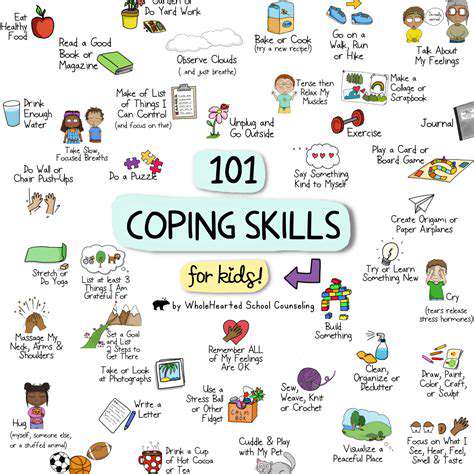Coping with ADHD Panic Attacks: Effective Management Techniques
Recognizing the Link Between ADHD and Panic Attacks
Understanding ADHD
Living with Attention-Deficit/Hyperactivity Disorder (ADHD) means navigating a world where focus feels fleeting and impulses often take the wheel. This neurodevelopmental condition doesn't just affect attention spans - it reshapes how people experience daily life. The constant struggle to stay organized or complete tasks can create a perfect storm of stress and anxiety. For many, this ongoing tension becomes the breeding ground for panic attacks that seem to come out of nowhere.
Imagine trying to juggle while riding a unicycle - that's what executive function challenges feel like for those with ADHD. Simple planning becomes an uphill battle, and unexpected changes can feel like personal betrayals from the universe. It's no wonder these moments sometimes spiral into full-blown panic episodes.
The Role of Anxiety in ADHD
Anxiety doesn't just visit people with ADHD - it often moves in and unpacks its bags. The mental load of constantly compensating for symptoms creates a background hum of worry that never fully quiets. This isn't ordinary nervousness - it's the exhausting reality of brains working overtime to appear normal in a world not designed for them.
The relationship between ADHD and anxiety resembles a toxic friendship where each condition makes the other worse. Forgetfulness breeds anxiety about forgetting, which then makes focusing even harder. It's a cruel cycle that traps many in its loop.
Common Triggers for Panic Attacks in ADHD
Panic triggers for ADHD minds often hide in plain sight. That innocuous email about a schedule change? Potential meltdown material. The growing to-do list that never seems to shrink? A recipe for disaster. Social situations become minefields where one wrong comment might confirm every insecurity.
Recognizing these danger zones marks the first step toward building better defenses. When you know what sets off the alarm system, you can start rewiring it.
Recognizing the Symptoms of Panic Attacks
Panic attacks don't always announce themselves with fanfare. For ADHD brains, they might masquerade as another bad focus day at first. But then comes the heart pounding like it's trying to escape, breaths that won't fill the lungs, and the terrifying certainty that something is terribly wrong.
The cruel irony? ADHD symptoms often make it harder to notice these warning signs until they're overwhelming. That's why learning to read the body's early distress signals becomes so crucial.
Coping Strategies for ADHD and Panic
Effective coping isn't about perfection - it's about having tools for when things fall apart. Mindfulness might start with simply noticing when you're holding your breath. Organization could mean color-coding just three priority tasks instead of the whole list.
The real game-changer comes from combining strategies like puzzle pieces. A therapist who understands ADHD can help fit them together in ways that actually work with - not against - neurodivergent brains.
Seeking Professional Help
Asking for help might feel like admitting defeat, but it's actually claiming victory over stigma. A good mental health professional doesn't just treat symptoms - they help decode the unique language of your brain.
This journey isn't about becoming neurotypical. It's about building a life where ADHD and anxiety don't hold all the cards. Where panic attacks become manageable storms rather than hurricanes that wipe everything out.
Developing a Personalized Coping Toolkit

Understanding the Foundation of Coping Mechanisms
Real coping skills aren't one-size-fits-all bandaids - they're personalized survival kits. Building them starts with becoming a detective of your own emotions. Notice how your body reacts when stress hits. Does your jaw clench first? Do thoughts start racing? These clues reveal where to focus your efforts.
The magic happens when you stop fighting your natural responses and start working with them. An afternoon walk might calm one person while another needs fifteen minutes with a coloring book. There's no right way - just what works for you.
Identifying Your Emotional Triggers
Triggers often hide in unexpected places. That certain tone of voice from a coworker. The way sunlight hits your desk at 3 PM. Our bodies often recognize danger before our minds catch up. Learning to trust those physical signals - the quickened pulse, the clenched stomach - can help intercept panic before it escalates.
Keeping a simple log of what happened before I felt awful often reveals surprising patterns. Over time, you'll start spotting trouble before it spots you.
Exploring Diverse Coping Strategies
Think of coping strategies like apps for your brain - some will crash immediately, others might surprise you. The key is staying curious rather than critical when something doesn't work. That silly stress ball might be useless until you're on a stressful call and realize it's keeping you grounded.
Don't overlook unconventional tools either. Some people swear by chewing gum during anxiety spikes, while others find relief in organizing their sock drawer. If it works without causing harm, it counts as a valid strategy.
Prioritizing Self-Care Activities
Self-care isn't just bubble baths and face masks - it's the unglamorous work of keeping your basic needs met. Nothing derails coping efforts faster than being hungry, exhausted, or dehydrated. Simple habits like keeping snacks handy or setting a bedtime alarm often make more difference than elaborate relaxation routines.
Remember that self-care includes saying no to things that drain you. Protecting your energy isn't selfish - it's how you stay functional.
Developing a Support System
Your ideal support team might look nothing like traditional expectations. Maybe it's one incredibly patient friend who gets it. Perhaps an online community that shares your struggles. Quality matters far more than quantity when building your safety net.
Practicing Mindfulness and Emotional Regulation
Mindfulness for ADHD brains can't always mean sitting still and meditating. It might look like noticing when you're holding tension during a TV show, or naming emotions as they pass by like subway trains. The goal isn't emptiness - it's awareness without judgment.
When big emotions hit, simple grounding techniques often work best. Naming five things you can see, four you can touch, three you can hear, two you can smell, and one you can taste can short-circuit panic's momentum.
Seeking Professional Guidance When Necessary
There's no shame in needing backup. A good therapist is like a personal trainer for your coping skills - they spot weaknesses you can't see and suggest adjustments you'd never consider.
If therapy feels daunting, start small. Many professionals offer free consultations to ensure a good fit. Remember - you're interviewing them as much as they're assessing you.
Seeking Professional Support

Understanding the Need for Professional Support
Reaching out for help is like finally calling a plumber after months of trying to fix leaky pipes yourself. Professional support isn't a last resort - it's recognizing that some challenges require specialized tools. This decision often comes with surprising relief, like setting down a heavy bag you didn't realize you'd been carrying.
The bravest moments sometimes happen in quiet therapy offices, not on battlefields. Admitting I need help takes more courage than pretending everything's fine.
Identifying Potential Benefits of Professional Help
A skilled professional does more than listen - they help reframe problems in ways that reveal unexpected solutions. They're like emotional archaeologists, helping uncover patterns buried beneath surface struggles. What seems like simple anxiety might actually stem from unprocessed grief or undiagnosed ADHD.
The right support can turn I'm broken into I'm learning. It provides both the mirror to see yourself clearly and the tools to make meaningful changes.
Different Types of Professional Support Available
Therapy isn't monolithic. Some approaches focus on changing thoughts, others on processing emotions, and some on practical behavior changes. There are specialists for trauma, neurodiversity, relationships - nearly every challenge has someone who's trained to help with it.
Finding the right fit matters more than finding the most prestigious credential. A therapist with less experience but more understanding of your specific needs will likely help more than an acclaimed expert who doesn't get you.
Navigating the Process of Finding a Professional
Searching for mental health support shouldn't feel like online dating, but sometimes it does. The magic combination often involves equal parts research and intuition. Credentials matter, but so does that gut feeling during the first conversation.
Don't be discouraged if the first try isn't perfect. Many professionals offer free initial consultations precisely because fit is so personal. It's okay to shop around until you find someone who clicks.
Overcoming Potential Barriers to Seeking Support
Cost concerns stop many people, but options exist at various price points. Some therapists offer sliding scales, while training clinics provide low-cost sessions with supervised students. Your mental health is worth exploring every possible avenue for support.
Time and transportation barriers crumble with the rise of telehealth. A lunch break video session from your car can be just as effective as an office visit - sometimes more so.
Maintaining Consistency and Engagement in Support
Therapy works best when it's treated like physical therapy - regular sessions with homework in between. Progress often comes in subtle shifts rather than dramatic breakthroughs. That moment when you automatically use a coping skill that used to feel impossible? That's the magic of consistency.
Honest communication with your provider fuels better results. If something isn't working or feels off, saying so allows adjustments that can make all the difference.